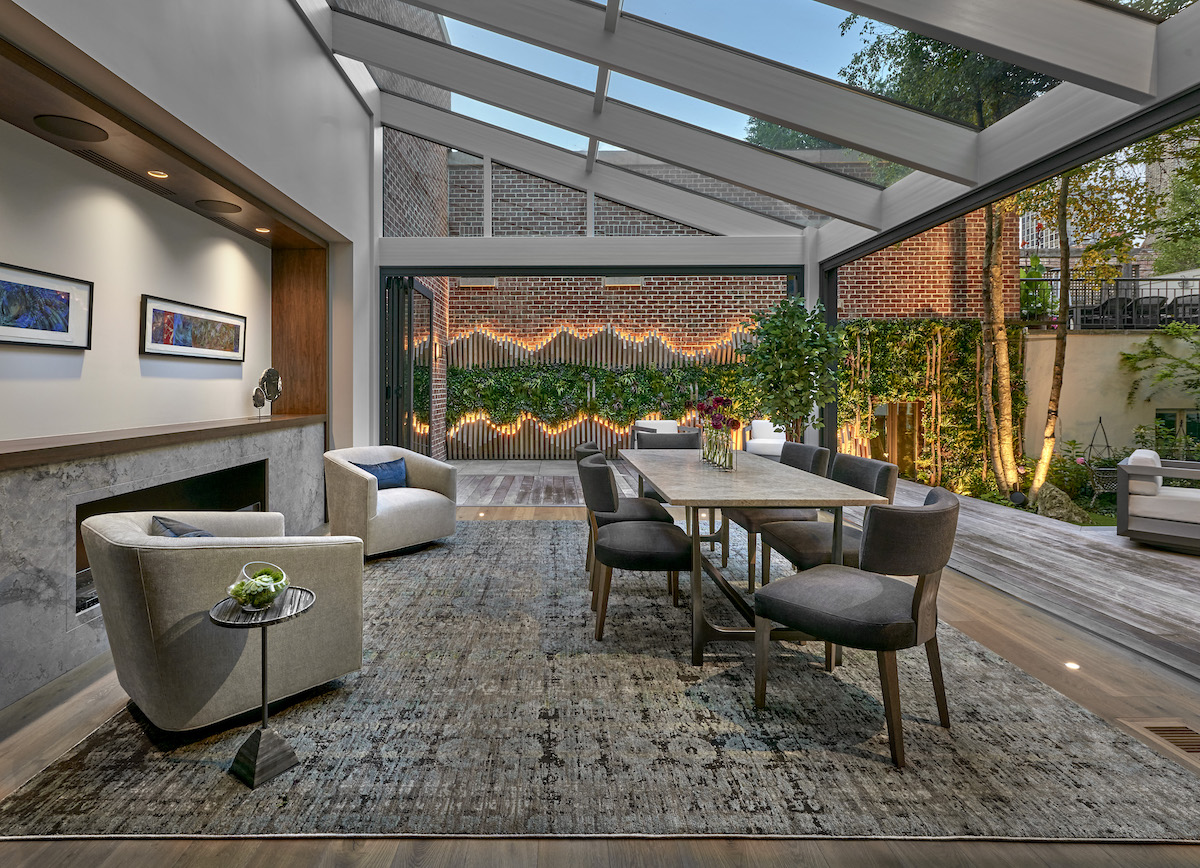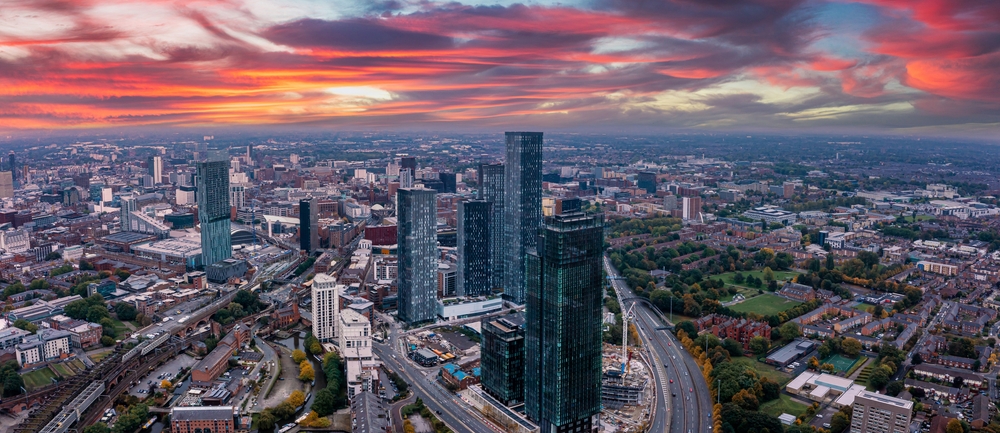Taking place Friday, May 13, at 1 Hotel & Homes in Miami Beach, Haute Residence’s annual Miami Luxury Real Estate & Design Summit featured three panels, which brought some of the biggest names in luxury real estate together for discussions on the current trends in luxury real estate, personal success stories, and what’s next for Miami’s real estate market.

Danny Hertzberg, Tony Rodriguez Jr, Daniel de la Vega, Senada Adzem, Oren Alexander, Nathan Zeder, Julian Cohen
Moderated by Daniel de la Vega, president of ONE Sotheby’s International Realty, the “Next Generation of Power” panel kicked off the summit and featured Senada Adzem (Douglas Elliman), Oren Alexander (Douglas Elliman), Julian Cohen (Julian Cohen Group), Danny Hertzberg (The Jills), Tony Rodriguez (Prestige Realty Group), and Nathan Zeder (EWM Realty International). The panelists discussed the techniques of bringing in international buyers and conquering cultural differences, but also stressed the importance of the local buyer.
Daniel de la Vega: Is Instagram the most effective form of social media right now for you guys? What would you say is the most effective?
Tony Rodriguez: Snapchat for me––we don’t use it. We like Instagram. Twitter is really dying.
Oren Alexander: You basically have to cover all bases, whether it's print, media, or social media. I still feel the most effective form of marketing is direct communication. I make it a point to basically travel around the world to various events where there is probably a high concentration of high-end net worth individuals… The relationship in those different industries––whether it's in film or art with various agents, advisors, consultants, or dealers––they’re real relationships.

Daniel de la Vega: So what you’re saying is, the fundamentals of our industry aren’t going to change and that’s that we are in a relationship business?
Alexander: I think it depends on what price points. I think there’s obviously been some new technology coming into the market to try to kind of lower the role of the broker. I think that our specific price point––at the higher end of the market––is definitely a relationship business.
Danny Hertzberg: I took the time to educate agents in my office and to teach them how to effectively use their platforms rather than just using networks. That then turned into speaking opportunities at other offices, and from that, I spoke at the National Association of Realtors and other conventions. Through educating the industry, I built a lot of these relationships around the country and the world.
Julian Cohen: Of course, the press is extremely important. You all advertise; you all should pay for Haute Living and all the other ads. It gives you fantastic exposure. However, for me, it's been Instagram that has been quite the success recently.
Daniel de la Vega: The global buyers––where are you seeing them coming from now?
Nathan Zeder: In the last six months, we’ve shown to more people from Asia, China, and Japan than we’ve probably had in the past three to six years, combined. It’s an interesting trend… The Asian market has been a really big player in the commercial side here, but not necessarily in the residential. We personally are believers that it’s where the big influx of foreign buyers is going to come from.
Senada Adzem: We’ve had several clients recently come to us from Switzerland and from Belgium, because of the security concerns that they have been a result of very unfortunate recent events… Interestingly, most of our Swiss clients want to be in Miami, and most of our clients from England want to be in Palm Beach; so I've started noticing differences as to where they’re from correlating to where they exactly want to be in Florida.
Rodriguez: My business partner is from London, so we do have a lot of buyers coming from London, but I see in the next couple of years that a lot of Chinese buyers are going to continue, and it’s going to grow. The reason is, China has made a lot of money in the past six to seven years. They've gotten a lot of new millionaires in their country. The Chinese now are going to have trouble in their own country with their wealth. I think a lot of them are really desperate to diversify their portfolios and to get their money out of their country; and a lot of them are really looking at the United States. They've been looking at New York for years, and now, with these new direct flights from China coming in to Miami, I think that’s really going to help us.

Nathan Zeder, Tony Rodriguez Jr., Danny Hertzberg, Julian Cohen, Oren Alexander, Senada Adzem
Daniel de la Vega: Where are the buyers coming from domestically?
Zeder: Domestically, most of our buyers are from Miami and stay within Miami. That’s what we’re seeing… I guess, outside of Miami, domestically, it would be from New York.
Adzem: Most of our buyers are from the North East and from Europe. In terms of the North East, it’s really New York and the tristate area. There are a lot of people from Connecticut. We also get people from Boston, Philadelphia, or Pennsylvania, Washington D.C, and all of the North East. They obviously love having a second or third home in Florida, but what more and more people are talking about is the tax situation.
Hertzberg: What’s come into play is a lot from the northeast corridor of New York, New Jersey, and Connecticut. A lot of the New York purchases, as previously mentioned, are tax driven. They want to establish residence in Florida. We see a lot from California for the same reason, high taxes. We’re also seeing a shift of many of the local buyers, and not just Miami, but coming from Naples, Palm Beach, and Fort Lauderdale.
Alexander: Definitely New York. There’s no secret with all that’s happening in the world today, the strength of the dollar, and the attraction to Miami from New York. I personally live in New York for half of my week. I’ve done deals where I’ve literally sold someone’s apartment in SoHo and then represented them here on a purchase in Bal Harbour. We all know the great reasons there are to live here, but of course, the tax purpose has been very, very strong over here.

Daniel de la Vega: How do you actually source these buyers when you’re traveling to other countries and meeting with them? How do you service them? Do you have to adhere to some of what they’re used to locally and in their cultur?
Cohen: When it comes to dealing with people, they want to feel comfortable. You’re selling them probably the biggest asset that they have, so you have to really make them feel comfortable with what they’re doing and doing that with you. I think that’s very important.
Adzem: The trick to sourcing clients internationally is really having a great relationship with them. Having logistic relationships with attorneys, accountants, and with really any trusted advisor to extremely wealthy people. In order for high wealth clients to trust you, someone they trust has to trust you. You’re trusted by association. A lot of times I’ll set up meetings with all the top accountants in whatever city I’m going to, and then I’ll ask my clients for suggestions and introductions in those particular cities. I think that’s the key. In terms of servicing clients and cultural sensitivity, I understand Czech and Russian, and so I can relate on many different levels. Clients really appreciate that. At least when you make an effort, even if you don’t speak the language, to just be sensitive to their costumes and ways of communication, it can play a big role.
Hertzberg: I think it’s important and definitely helpful to understand different cultures and different languages. A lot of what I’ve seen is the same standard that how you want to be treated is how you want to be treated. A lot of times respect goes beyond language and cultural understanding. In working with those markets, I think what was said before with those relationships is that they transcend cultural differences. The personal introduction and getting face-to-face, as they said, is a critical component.

Daniel de la Vega: What do you guys foresee the next 12 months looking like as far as buyers coming to South Florida?
Alexander: If you have the best product, in the best location, you have nothing to worry about. Unfortunately, we went through such a boom where there were a lot of houses that were built or overbuilt on lots that weren’t so great. Penthouses built in buildings that weren’t so great, and I think that those types of products won’t do so well.
Hertzberg: From my perspective, what we’re seeing is a correction in pricing. Right now I think price is a huge driver––every price point in every area. It’s always a big factor in the market, but now more than ever. I think what we have now is a lot of price sensitivity in the market. You’re seeing properties come down from certain prices, even more so in the condos than the single-family homes. As they are hitting certain price points, they're disappearing. If you look at the sales for the last 30 days, 75 percent of them sold with price reductions. So you’re seeing homes hit the market, condos hit the market, even projects that are decreasing, until they hit a certain point, and then they’re gone.

Nathan Zeder, Tony Rodriguez Jr., Danny Hertzberg, Daniel de la Vega, Julian Cohen, Oren Alexander, Senada Adzem
Daniel de la Vega: Where do you see the buyers coming from in the next few months?
Cohen: I think the Colombian people––if you look at the numbers, they’ve been purchasing a lot over the past couple months. A lot more than the Brazilians have. They kind of took over, and even though they have a smaller country, there’s a good amount of wealth that’s coming from there. The Colombians love our city, so I think that’s a big place that we’re going to be seeing business come from as well.
Rodriguez: We’ve been reaching out and doing a lot of international marketing, but I think for the next 12 months, we’re going to focus on the local buyer, the Miami buyer, and really all across the U.S.. We don’t have to always reach out internationally. We need to start investing money into our own United States market.
Zeder: It’s really the personal connections that you have in town that I think are the strongest buyers over the next 12 months, because right now it’s the local buyers on the sidelines who are active. They’re the ones who live here, they understand more than anyone else what's been going on in the market. They've seen these prices go crazy. I think there are still great opportunities to come and it’s those local buyers that are going to have full advantage.
Adzem: I think there are major macro forces at play right now and depending how they play out over the next year, it’s going to determine where the buyers come from. What I’ve seen lately it's a political impact, it’s currency fluctuation, and very importantly, it’s what’s going to happen in the election. There’s a sort of apprehension by many buyers, and that’s going to impact a lot.
Photography by David Heischrek/DHPA







